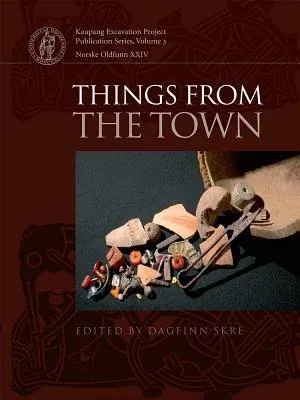In this third volume deriving from the 2000-2003 excavations of the
Viking town of Kaupang, a range of artefacts is presented along with a
discussion of the town's inhabitants: their origins, activities, and
trading connections. The main categories of artefact are metal jewellery
and ornaments, gemstones, vessel glass, pottery, finds of soapstone,
whetstones, and textile-production equipment. The artefacts are
described and dated, and their areas of origin discussed. The volume is
lavishly illustrated. An exceptional wealth and diversity of artefacts
distinguishes sites such as Kaupang from all other types of site in the
Viking World. Above all, they reflect the fact that a large population
of some 400-600 people lived closely together in the town, engaged in a
comprehensive range of production and trade. The stratigraphically
distinct layers from the first half of the 9th century allow us to put
precise dates to the finds, and to the buildings and evidence of
activities associated with them. The finds and structural remains make
it possible to identify the activities that took place within the six
buildings excavated. We can distinguish between some buildings that were
only temporarily in use and others that were permanently occupied.
Several of the temporary buildings were used by a variety of craftsmen
while those under permanent occupation were houses, and only to a
secondary degree, workshops. Throughout the life of the town from c. AD
800-930, trade links with southern Scandinavia, the Baltic, and the
Irish Sea would appear to have been strong. In the earliest phases of
the town there was considerable trade with the Frisian regions, probably
with Dorestad, but this link faded markedly in the second half of the
9th century, probably because of the abandonment of Dorestad. Within
what is now Norway, Kaupang seems to have been supplied with goods from
the interior of eastern Norway. Goods from around the western coasts of
Norway, however, are practically invisible. Finds of personal equipment
show that the inhabitants of the town were of diverse origins. Many of
them were from southern and western Scandinavia, but there were also
Frisians there. One house can be identified as that of a Frisian
household engaged in trade. There were also Slavs in Kaupang, although
it is not clear whether they were long-term residents.

